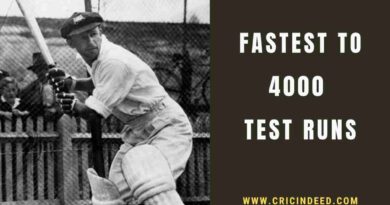Fastest to 2000 Test Runs
| Player | Team | Innings to 2000 Runs | Time Taken |
|---|---|---|---|
| Don Bradman | Australia | 22 | 2y 362d |
| George Headley | West Indies | 32 | 9y 164d |
| Herbert Sutcliffe | England | 33 | 4y 37d |
| Michael Hussey | Australia | 33 | 2y 60d |
| Marnus Labuschagne | Australia | 34 | 3y 70d |
| Doug Walters | Australia | 35 | 4y 43d |
| Brian Lara | West Indies | 35 | 4y 115d |
| Arthur Morris | Australia | 36 | 4y 65d |
| Everton Weekes | West Indies | 36 | 5y 29d |
| Frank Worrell | West Indies | 36 | 6y 34d |
Fastest to Every 1000 Test Runs
Key Insights
22 innings needed by Don Bradman to reach 2000 runs are the fewest by a batter in Test cricket.
Bradman averaged 100.71 when he crossed the 2000-run mark, the highest among all batters in Tests.
England’s Kevin Pietersen took the shortest time to score 2000 Test runs. He needed a year and 158 days to reach the milestone after his debut.
Viv Richards (1y 264d), Michael Slater (1y 245d), Yashasvi Jaiswal (1y 335d), and Andrew Strauss (1y 356d) are the others to complete 2000 Test runs within two years of their debuts.
Arthur Nourse, though, took the longest time. The former South African had to wait for 13 years and 200 days to score his 2000th Test run.
Australia’s Lindsay Hassett (13y 152d) is the other batter to take more than 13 years to reach the mark. Coincidentally, both batters careers overlapped with the Second World War.
Herbert Sutcliffe, who still holds the overall record for the fastest 1000 Test runs, is the fastest opener to reach 2000 Test runs. The former English opener took 34 innings.
AB de Villiers is the fastest to score 2000 runs as a wicketkeeper in Test cricket. The former South African required 39 innings.
Sachin Tendulkar is the youngest batter to aggregate 2000 Test runs. He was 20 years and 330 days old when he achieved the landmark in March 1994.
Australia’s Clement Hill was the first batter to score 2000 runs in the longest format. He reached the mark in 47 innings in 1904.





